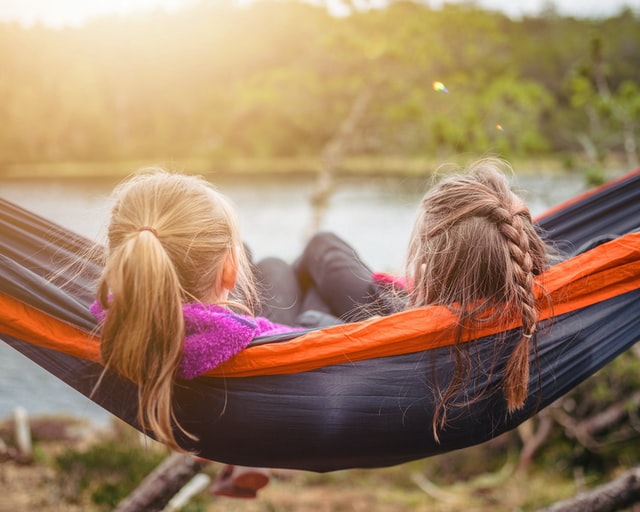
Our granddaughter is enrolled in day camp for the first time. This is big news, especially since her week concludes with an overnight stay in a real cabin! What could be more grown up? My own camp experience as a child is best described as “barely.” Yes, I did manage three shining days between fourth and fifth grade at a beautiful camp in the Shenandoah Valley.
Three days? Why so short?
First, keep in mind, I never expected such a fabulous opportunity. In my world, only characters in books went to camp. Furthermore, my mother did not embrace the idea. It seemed every time the bespectacled, shrimpy girl named Carol Bailey left the house, she got hurt with broken fingers, a broken arm, poison ivy, or battered knees and elbows. I was a walking disaster.
Reluctantly, though, she allowed me to go. Then, a few days in, news of a child being hurt reached her ears. Fairly or unfairly, she concluded that campers weren’t being sufficiently supervised and drove up to take me home.
You might judge this a wrong response. Yet my mother was reared in the Brooklyn tenements of the 1920s. She recoiled from any activity that involved forests, lakes, or snakes. She also knew my proclivities for injury. Neither tears nor wailing could change her mind.
A handful of black & white photos document my career as a camper. Two featured a cabin-mate who hailed from the exotic land of Maryland. She was taller and even skinnier than I. We were cut from the same silly cloth. One picture shows her laughing on her bunk and the second proves that we stood outside of the snack bar laughing hilariously while a summer storm drenched our clothing.
Both photos stayed on my dresser for years, symbolizing the freedom that, surely, awaited me as an adult. All I needed to do was grow up so I could do anything I wanted, right?
Kids inevitably believe that adults do whatever they wish. This misconception is nothing new, but blares like fireworks in today’s culture. A shocker awaits children when reality kicks in. The sting of this particular truth leaves some young persons unable to make the transition into actual adulthood.
An adult’s day is filled with duties and responsibilities. Even if willingly selected, these things take diligence to accomplish. Work is never done. Laundry is never done. Communications are never fully caught up. The car is never fully vacuumed. The more one tries to do, the longer the lists of duties becomes.
A well-ordered life means staring down a list of to-do’s. Some things on the list are pleasant, of course, such as a date for racquetball after work, a gathering with friends for a meal, or practicing the cello. Every once in a while, adults have windows of actual free (unscheduled) time but these are rare. In short, no matter how arranged, a positive, functioning adult life is framed by demands.
So how do we disabuse children of the notion that the “chains” of childhood will burst into a giddy horizon of mythical freedom? Here parents suffer from the lost underpinnings of a solid community, intact family, and a vibrant church life. Ever fewer children grow up watching a mom and dad plus older siblings engaged responsibly in household duties and community work. This classic pedagogy that once invisibly transferred skills and understanding to children simply does not exist in many families.
I am fond of proverbs. To the point of driving everyone nuts, I preach sayings like “work done cheerfully flows; work done in resentment slows.” There is no end to such sayings pouring from my mouth.
And that leads me to turn to the spiritual side of the equation. Recently I’ve been thinking on the words of a favorite historical figure: Pope John Paul II. Fascinated as I was by this man who, arguably, fractured the Iron Curtain, my interest magnified when I began traveling regularly to Poland.
Today is not the time for me to write a polished discourse on John Paul II. But I will encourage you to explore his sayings and written legacy. They attest to his stunning courage in the face of political persecution. His reflections on suffering and sorrow focus on releasing these pains to our Divine Creator and giving birth to works of love towards our neighbors. His words are stunning to read.
Maybe it is too odd to flip from my fuming about who failed to carry the laundry upstairs to images of the future pope Karol Wojtyła toiling in a quarry in the 1940s to avoid deportation to Nazi Germany. But it does put things into perspective.
The majority of adults surviving (or succumbing to) political oppression remain nameless in the dust of history. If we look back, we may find them among our own ancestors. Either way, as children, these people probably dreamed about a carefree adulthood in which they could do whatever they wished. Hopefully, along the way, a more accurate picture of grown-up life was given them, wherein principles of fortitude and duty were instilled. Perhaps, too, they were taught scriptural values and virtues that helped them offer up their challenges and tap into God’s ceaseless energy.
No matter how worded, young people need to hear messages that transcend the damaging ideas broadcast so loudly about adulthood being a long stretch of self-indulgence. Old adages hold true and have power. They may lie dormant, even scoffed at in youth, only to awaken in adulthood when their strength and balm is needed most.




This is a great post, thank you!